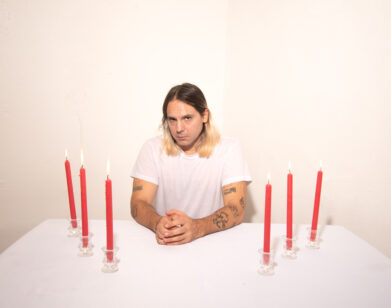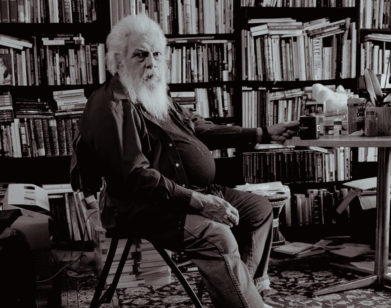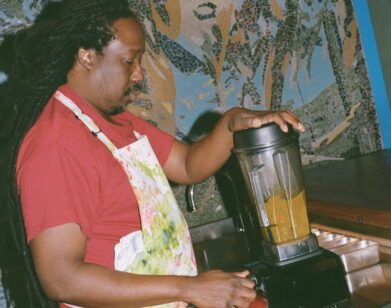THEATRICS
“I’m Such a Bitch for Words”: Maya Martinez on Car Crashes and Poetry Tours
Maya Martinez writes for the real yearners. Her poetry and plays respond to the absurd without relying on cynicism or camp, leaving you struck by the earnestness of her characters (which include farm animals, sugar daddies, and girls in furry boots). She’s drawn comparisons to Ryan Trecartin and Cookie Mueller and is equally an effervescent performer—at readings, I’ve heard onlookers say, “Who is that?!” When I first met this Floridian freak, she was writhing on the ground at a Chinatown gallery while performing Hole Play, her one-woman existential drama that appears both in chapbook form and in her debut collection, Theatrics, published this week by Wonder Press and Metalabel. I was swallowed by her aquamarine eyes and lack of inhibition, like a realization of the Pig’s dream in one of the scenes in Theatrics: “My fantasy is that people come to see me and get lost in the image and become infected by me.” Martinez likes to play, so we met on the Coney Island ferris wheel before her book launch party to talk about being foolish online, meeting her heroes, and taking the show on the road.
———
MAYA MARTINEZ: Are we in the adults-only line? The swinging line.
MEKALA RAJAGOPAL: We’re swingers. Okay, we’re ascending.
MARTINEZ: It’s a really nice day.
RAJAGOPAL: This is beautiful. [Car swings] Wait, is this a fucking rollercoaster?
MARTINEZ: [Screams] Oh, it swings!
RAJAGOPAL: I didn’t know it was going to swing that much. [Laughs] I love how you asked Instagram where the best ferris wheel in New York City is. Not much outside of Coney Island, it turns out.
MARTINEZ: I will literally ask Instagram anything. I had a staph infection recently and I was on there like, “Do you think this is staph?”
RAJAGOPAL: Wait, the spider bite on your ass?
MARTINEZ: Yeah.
RAJAGOPAL: You just posted the ass pic on Instagram like—
MARTINEZ: “What’s going on here?” I don’t feel any shame. I haven’t been to Coney Island in nine years, and I’d rather ask Instagram than AI. One time I was like, “I want to buy a prairie dress that looks like this,” and so many people gave me great suggestions. Ideas from people you know are always going to be better than whatever you can find on Google.
RAJAGOPAL: Do you use ChatGPT?
MARTINEZ: I don’t do AI, but when I Google something, it does give me the AI answer first. I used it once when trying to plan a trip, and once when I was trying to come up with a fake mural.
RAJAGOPAL: I feel like the time we used ChatGPT to generate knock-knock jokes for Library [at Performance Space New York] was a moment when it felt like a more absurd application, but the vibe around it has changed so quickly.
MARTINEZ: Oh yeah, that was last November.
RAJAGOPAL: It felt so hehe haha when we did it, but now I’m like…
MARTINEZ: Is this a military grade weapon? [Laughs]
RAJAGOPAL: So, how did the title Theatrics come about?
MARTINEZ: Well, these are theatrical works, but a lot of the beginning plays I wrote came from thinking, “What if a play was a poem and a poem was a play? What if you just break down language like that?” My publishers are Ben [Fama] and Chariot [Wish], and Chariot was like, “What if you shortened it down to Theatrics?” It made perfect sense.
RAJAGOPAL: It does. You’ve performed all of the pieces before.
MARTINEZ: At least once, yeah.
RAJAGOPAL: How many times have you performed Hole Play?
MARTINEZ: I want to say six times.
RAJAGOPAL: What’s your trick to memorizing?
MARTINEZ: I record myself reading it with no affect, slowly. I should be listening to it every minute I possibly can right now, because I’m memorizing something I’ve never memorized before.
RAJAGOPAL: Which one?
MARTINEZ: I Lived How I Died. And the way I wrote it can trip me up sometimes. “I lived how I died, wearing the shape-shifting bustier—”
RAJAGOPAL: The bustier. The Skims.
MARTINEZ: [Laughs] She’s sucking in.
RAJAGOPAL: She’s engaging her core.
MARTINEZ: Every night before I go to bed, and every morning when I wake up, I make myself write every line down seven times and go section by section. If I’m still not understanding a section, I make myself rewrite it over and over and say it out loud as I rewrite it. I’m doing four pieces for my book launch, and my parents are going to be in it.
RAJAGOPAL: I was going to ask you about that. Which one are you most looking forward to performing?
MARTINEZ: I think it’ll be fun to do these pieces with my parents, but my personal favorite is the car crash piece, the first piece in the book, because it has a lot of stage directions. I think it’s funny to pretend to be in a car crash while “Tomorrow” is playing.
RAJAGOPAL: It’s very like, car crash, freeze frame, ”you’re probably wondering how I got here.”
MARTINEZ: It is, and that’s why I love it. She died and now she’s telling you about her life.
RAJAGOPAL: Which ones are your parents in?
MARTINEZ: I don’t want to give too much away—I’m going to give some away. My mom is going to be with me in I Lived How I Died. And then my dad’s going to perform Prayer For Money.
RAJAGOPAL: I’m so excited to see that one.
MARTINEZ: I sent them the script today and they were both like, “Thank you, well received.” I need to get them together and do a quick run-through. I don’t know why I did that.
RAJAGOPAL: Ask your parents? I remember you talking about it for a while.
MARTINEZ: Yeah. Now I’m like, “Why did I do that? I’m scared.”
RAJAGOPAL: What are you scared of?
MARTINEZ: I think this is something my mom does. She got married on her birthday. My birthday is the next day, both my parents are in town with their respective spouses, it’s my book launch. You know what I mean? Like, what else can I pile onto this to make it stressful? For me, putting my parents in my work is a way that I could have a relationship with them as an adult. It gives me some structure. It’ll all work out, though.
RAJAGOPAL: It will. It’s a good concept. Let’s look for the shade.
MARTINEZ: This is the shade room.
RAJAGOPAL: Not that. Which is the earliest piece in the book?
MARTINEZ: I wrote The Play, about the pig and the lamb, in the end of 2017 to the beginning of 2018.
RAJAGOPAL: That’s my favorite one.
MARTINEZ: Really? Why do you like it?
RAJAGOPAL: It’s very heartwarming, and the sunset moodiness of it all. It’s also very tag yourself. I feel like I’m both pig and lamb.
MARTINEZ: Yes. I feel like I wrote those two people as two parts of myself I was feeling at the same time. The writing is on the wall.
RAJAGOPAL: I could sense that. We’re living the pig and lamb beach fantasy right now.
MARTINEZ: We literally are. We’re like, “What’s your ultimate fantasy?”
RAJAGOPAL: “Doing molly on the beach.” Your work is so character-driven. Who are some fictional characters that inspire you?
MARTINEZ: That’s a really good question. Thelma & Louise. That movie breaks my heart. I love a road trip movie.
RAJAGOPAL: You’re a car girl.
MARTINEZ: I’m very vroom vroom. I really love Penny Lane from Almost Famous. In Through the Valley of the Nest of Spiders by Samuel R. Delany, there’s some really, really good characters. One’s named Shit and the other one’s named Eric and—I’m going to cry—it’s a beautiful book about love and how those two characters approach their lives. Delany was really cooking with that one. Oh, you know who was really great?
RAJAGOPAL: Who?
MARTINEZ: Linda Manz’s character in Days of Heaven. There’s so much of herself in that role, even though it’s fictional. The actress was asked to narrate the movie after the movie was filmed and she improvised it while she watched the movie. I didn’t know that until I researched the movie later. That makes me think of Mary Catherine Gallagher. When Molly Shannon talks about making that character, she’s always like, “I’m playing my dad and I’m playing myself.” Same with Sally O’Malley. She’s pulling from people from her life, but she’s not making fun of them. It’s never a disservice to them.
RAJAGOPAL: That’s a really good list. You also met Samuel [R.] Delany recently. What was that like?
MARTINEZ: I feel like I’ve been in tears ever since. Taylor Lewandowski, a fellow writer, was going on a road trip and had just emailed him to have dinner, and I was like, “Can I come?” I was so nervous, but I knew there was no way for it to be awkward or wrong, and it wasn’t. Chip lives with his partner Dennis, and their apartment is really sweet and welcoming. Chip was like, “I don’t get that many visitors and we don’t see people for days at a time.” It’s kind of heartbreaking to meet someone at the end of their life. There’s some things about death that I don’t know how to fully process. I feel like I owe a karmic debt to elderly people in my life, in this weird way. I wasn’t able to be there for my grandmother at the end of her life, and I’m friends with so many older people now that I really appreciate those relationships. So it was bittersweet. I got to talk to this person who changed my life, and that doesn’t happen every day.
RAJAGOPAL: Yeah.
MARTINEZ: I don’t know if you’ve ever met someone and they do something and you’re like, “That’s exactly what you would do.” We were eating soup and a mushroom dropped on the ground and he was like, “Just pick it up and put it back in my soup.” And I did, and I thought, that’s exactly the ethos of almost everything you write is about, in this insane way. Then I cried for three days because it was so beautiful. I want to go back and visit.
RAJAGOPAL: Where does he live?
MARTINEZ: Philly. He’s a big influence on me. And Cookie Mueller, if you’ve ever read her short stories, they’re so insane. There are a lot of contemporary people I’m always amazed by. I recently went and saw Amanda Horowitz’s Bad Stars, an adaptation of True West, the Sam Shepard play. I saw it three times and cried every time. I think it was a perfect piece of art. And then there are people I came up with in Baltimore. The artist that’s directing me at my book launch, Jake Dibeler, he’s a huge inspiration to me. We’re always joking that I’m his daughter and he’s my mother.
RAJAGOPAL: You’re doing three launch events in New York?
MARTINEZ: So there’s the initial book launch at KGB, and then I am doing, as part of the launch programming, an event on July 16th at Dear Friends Books. And then I’m going on the month-long book tour so the tour launch is August 1st at Parkside Lounge.
RAJAGOPAL: Tell me about your book road trip in your pickup truck.
MARTINEZ: I’m doing East Coast and West Coast. Parkside Lounge, then Hudson at Debs Oasis. I’m trying to book Providence, then I’m doing Pittsburgh, Baltimore, D.C., Richmond, Durham, Asheville, Atlanta, Tallahassee. Gainesville. Then I’m going to visit my family in Florida. Then my friend willow [wilderness hour] and I are doing The Play down the West Coast, in Oakland, L.A., San Diego, Palm Springs, Phoenix, Tucson, Albuquerque, Santa Fe, and Las Vegas. I’m really excited about the show in Vegas. It’s going to be so sick. I’ve always wanted to do something there. Then Joshua Tree, L.A. again, and two shows in Oakland.
RAJAGOPAL: Wow, that’s a lot. But you’ve done a poetry road trip before.
MARTINEZ: Yeah, in 2018. I wish I could do it forever.
RAJAGOPAL: It’s the kind of thing that seems like a far-flung fantasy, but you actually did it before and you’re doing it again. That’s so cool.
MARTINEZ: Thank you.
RAJAGOPAL: Where were some random places you read the first time?
MARTINEZ: One of them was Santa Cruz. We’re trying to go this time too. Because it’s so expensive there, I stayed with these college kids I met on Instagram and we just played a house show in their living room. They were like, “I never knew poetry could be like this.” We also performed at a church in a very small town in northern California. We performed in New Orleans at this flower shop bookstore owned by these lesbians. We did a house show in Tallahassee. We performed in Marfa, Texas at an art gallery. It was interesting to meet people who were living in Marfa for the summer.
RAJAGOPAL: I feel like you can make something happen in Marfa again.
MARTINEZ: I want to fix my car and start in New Orleans and do a middle-of-the-country thing. I just can’t do two months in a row.
RAJAGOPAL: What’s life on the road like?
MARTINEZ: I think you’re right when you said it sounds like a dream, but in actuality you’re just sleeping on someone’s floor and car camping in the desert in August. You do get addicted. It’s addicting to go somewhere new every night, meet local talent, perform well to a group of people—
RAJAGOPAL: And they’re all strangers.
MARTINEZ: Yeah. Everyone’s nice to you and takes you places, and you get to have regional food like In-N-Out and Waffle House. It’s taxing because you’re never alone, but you become a very good performer when you have the opportunity to experiment every night in front of new people. Sometimes you perform something here and you only get to do it once. It’s a great way to connect with people, which sounds so hippy dippy but it’s true.
RAJAGOPAL: I feel like you’ve been around town more lately.
MARTINEZ: I love the town. I finally started going to bed later. I want to go out dancing, and readings are fun. We’re really lucky to see a lot of readings, even if people get sour on them. It’s beautiful. You just made a work of art out of your mouth. [Laughs] Also, I’m pretty underemployed right now, so I’m just like, it’s time to be outside.
RAJAGOPAL: You might as well. I’m always impressed by how many things you accomplish in one day, though.
MARTINEZ: [Laughs] I think I scare people.
RAJAGOPAL: What’s your routine? I know you do morning lines.
MARTINEZ: Lately I’ve been waking up between 8:30 and 9:00. I read my lines, drink coffee, then I write five things I’m grateful for, when I felt present the previous day, what I could do better, and what I did well. Now, I’m organizing the tour, and my ideal lineup is local poets, me and then a noise music act, so I’m emailing a lot of people. I try to walk 10K steps a day to keep the anxiety down. I’m writing a Substack piece right now that I want to finish. I keep posting on Instagram like, “For the record, I just want to say I don’t want to become a pillar of salt.”
RAJAGOPAL: Oh, yeah.
MARTINEZ: I’m turning 30 and the book’s coming out, and I’m just looking at the past 10 years of my life. I just keep looking back. You know that Bible story where when you look back you become a pillar of salt?
RAJAGOPAL: I don’t know anything about the Bible.
MARTINEZ: It’s like that movie Black Orpheus. In the Bible, they’re leaving Sodom and Gomorrah and Lot’s wife looks back because she’ll miss her wealthy life in this city that’s burning to the ground for the sin of inhospitality. She looks back and she turns into a pillar of salt. And I don’t want to turn into a pillar of salt because I’m romanticizing parts of my life that were more toxic than I’d like to remember. It’s easier to look back than to look forward and sit with the uncertainty of life.
RAJAGOPAL: That’s so wise.
MARTINEZ: Whoa, look at that ride. It couldn’t be me. I wonder if your blood is just really flowing through your body after doing that.
RAJAGOPAL: In a red light panel kind of way?
MARTINEZ: Yeah, the blood’s really pumping.
RAJAGOPAL: It’s like, actually just get on the Swinging Stick 9000 for improved circulation.
MARTINEZ: I was house sitting for someone, and they had this thing where you could strap yourself in and turn yourself upside down and all the blood would rush to your head.
RAJAGOPAL: I’ve seen that. I want to ask about something sillier, which is your “humility” necklace.
MARTINEZ: [Laughs] I’m just a tweaker and I love words. I’m such a bitch for words. I have “Faith in God” tattooed on my palms. I have “Sweet sweet sweat sweat sweet.” A lot of last year I was trying to understand what it meant to have humility. That’s what Vehicular Manslaughter in Ibiza is about. I kept having these conversations and I came to understand humility as the opposite of righteousness. Even now, I don’t know if I could tell you what humility meant out loud, but when I’m doing it, I can feel it in my body. So I got it made into a necklace and I want to wear it forever.
RAJAGOPAL: Are you going to ever have a public Instagram?
MARTINEZ: No. I used to and it scared me. I’m foolish on there. My Instagram is becoming an ad right now to promote the book, but when you have a public Instagram, you start to become an ad of who you are. After I’m done promoting this book, it’s back to silly town on the grid.
RAJAGOPAL: What’s on your Reels feed? Or do you do TikTok?
MARTINEZ: I can’t have TikTok because I will get schizophrenia. I feel like I have the potential to be a viral person online, but I don’t think I should ever be allowed access to fame so quickly. If I get famous, it should be a very slow drip. Otherwise, that’s where the righteousness comes in. It’s just so easy to be righteous online. My reels are a lot of Love Island right now.
RAJAGOPAL: Are you caught up?
MARTINEZ: I’m two or three episodes behind.
RAJAGOPAL: We should catch up later. Do you want to lie down on the beach or go to the park again?
MARTINEZ: I want to lie down on the beach.
RAJAGOPAL: Let’s get a tan.









